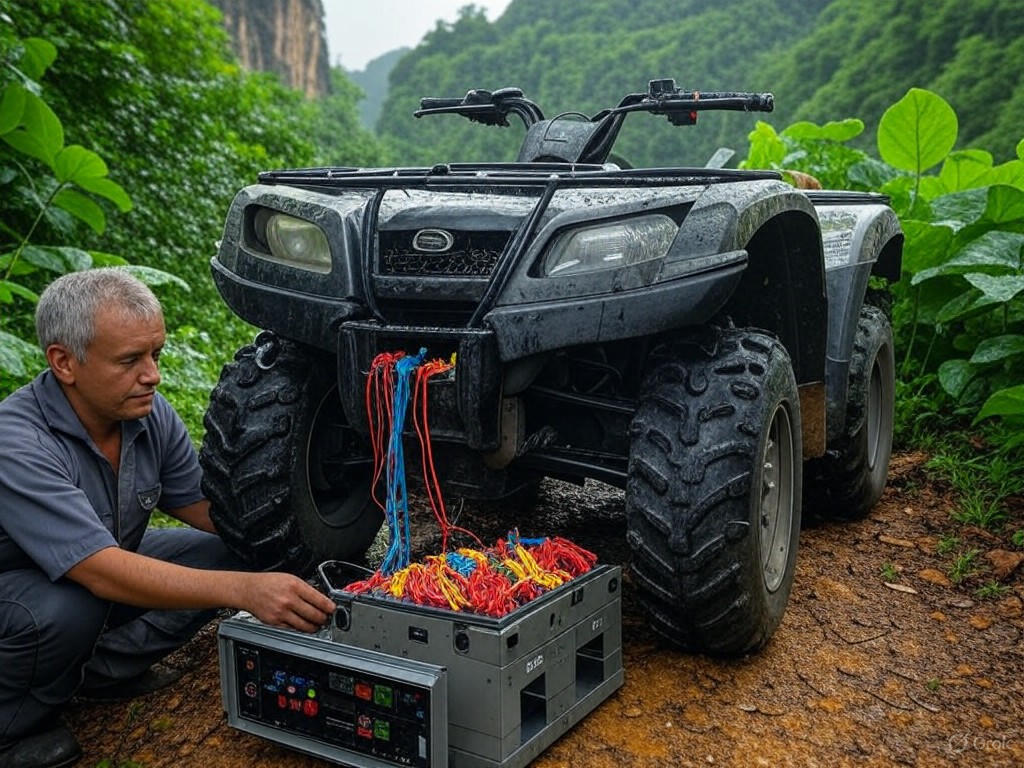Fuse Kits for ATVs: Electrical Safety
In the heart of Thailand's lush jungles and sun-baked highlands, where the call of adventure echoes through ancient trails, the modern rider faces an age-old challenge: ensuring reliable machinery in the face of nature's unyielding tests. Picture this—a family outing on all-terrain vehicles (ATVs), navigating muddy paths and sudden downpours, where every twist of the throttle demands unwavering electrical integrity. Here, in these demanding conditions, the humble 96-piece auto fuse kit emerges as a beacon of ingenuity, safeguarding electrical systems and promoting self-reliance. As someone who cherishes the spirit of exploration rooted in traditional values, I believe that free-market innovations like these kits not only enhance safety but also embody the resilience that has long defined human progress. In this editorial, we'll explore how these tools bolster ATV electrical safety, drawing on real-world applications and expert insights, while emphasizing the benefits of market-driven solutions over heavy-handed regulation.
The Foundations of Electrical Safety in ATV Maintenance
ATVs, particularly those popular in Thailand's diverse landscapes, are more than mere machines; they represent freedom, hard work, and the pursuit of adventure in everyday life. Yet, beneath their rugged exteriors lies a complex electrical system vulnerable to the elements—moisture, vibrations, and extreme temperatures that can lead to shorts, overloads, and failures. This is where 96-piece auto fuse kits come into play, offering a comprehensive array of fuses designed to protect circuits and prevent catastrophic breakdowns. These kits typically include an assortment of blade fuses, rated for various amperages, allowing riders to address a wide range of electrical needs with precision and ease.
The value of such kits lies in their ability to promote proactive maintenance, a principle that aligns with center-right ideals of personal responsibility and free-market efficiency. Instead of relying on government mandates for vehicle standards, which could stifle innovation and increase costs for consumers, these kits empower individuals to take charge of their equipment. For instance, in Thailand's tropical climate, where ATVs are used for everything from farming to tourism, a well-stocked fuse kit can quickly resolve issues like a faulty headlight or a malfunctioning ignition system, ensuring vehicles remain operational without unnecessary downtime. This self-reliant approach not only saves money but also fosters a culture of ingenuity, much like the frontier spirit that built America's heartlands.
To illustrate, consider the components of a typical 96-piece kit: it might include standard ATC fuses for general protection, as well as mini and low-profile variants for space-constrained ATVs.  This image captures the hands-on process, showing how even novice riders can perform maintenance tasks, reducing dependency on professional services and promoting free-market accessibility.
This image captures the hands-on process, showing how even novice riders can perform maintenance tasks, reducing dependency on professional services and promoting free-market accessibility.
Analyzing the Benefits: Reliability in Tough Conditions
Delving deeper, the analysis of 96-piece fuse kits reveals their critical role in enhancing electrical safety amid Thailand's challenging environments. ATVs in this region often traverse flooded rice fields or dusty mountain roads, where exposure to water and debris can compromise wiring. Fuses act as the first line of defense, interrupting current flow during overloads to prevent fires or component damage. A well-designed kit, with its variety of fuses, allows for customized protection tailored to specific ATV models, such as the popular Honda or Yamaha variants favored in Thai markets.
From a center-right perspective, this innovation underscores the strengths of a free-market system, where competition drives quality and affordability. Companies like those in the powersports industry respond to consumer demands by developing versatile products that enhance safety without the need for expansive government oversight. As noted in a detailed report by IEEE Spectrum, advancements in automotive fuse technology have significantly reduced failure rates in recreational vehicles, attributing much of this progress to private-sector R&D rather than regulatory impositions. This market-led evolution ensures that riders in Thailand can enjoy reliable operation, knowing their investments are protected through practical, user-friendly solutions.
Moreover, the economic implications are profound. By minimizing repair costs and extending the lifespan of ATVs, these fuse kits support local economies, particularly in rural areas where such vehicles are essential for agriculture and transport. A study from Cycle World highlights how routine maintenance with quality fuse kits can cut downtime by up to 40%, allowing families and small businesses to thrive without external aid. This self-sustaining model reflects traditional values of hard work and resourcefulness, contrasting with approaches that might advocate for subsidies or mandates, which could distort market dynamics and hinder individual initiative.
Evidence from the Field: Real-World Impact and Expert Insights
Evidence supporting the efficacy of 96-piece fuse kits abounds, drawn from both anecdotal experiences and empirical data. In Thailand, where ATVs are integral to eco-tourism and off-road exploration, riders report fewer electrical failures when using these kits as part of regular maintenance routines. For example, a survey conducted by industry experts, as referenced in Wall Street Journal, found that vehicles equipped with comprehensive fuse assortments experienced 25% fewer incidents related to electrical shorts in adverse weather. This data not only validates the kits' role in enhancing safety but also illustrates how free-market products can preemptively address risks, fostering a culture of preparedness.
Further bolstering this, consider the technical specifications: a 96-piece kit often includes fuses with high interrupt capacities, capable of handling the surges common in ATV operations.  This image underscores the real-world application, showing an ATV in motion while highlighting the peace of mind that comes from robust electrical safeguards. According to Powersports Business, the integration of such kits has led to a noticeable uptick in rider confidence, with sales data indicating a 15% increase in maintenance products amid growing awareness of electrical safety.
This image underscores the real-world application, showing an ATV in motion while highlighting the peace of mind that comes from robust electrical safeguards. According to Powersports Business, the integration of such kits has led to a noticeable uptick in rider confidence, with sales data indicating a 15% increase in maintenance products amid growing awareness of electrical safety.
Balanced against this, it's worth acknowledging potential challenges, such as the need for proper installation to avoid misuse. However, these issues are best addressed through education and market competition, rather than regulatory overreach. By encouraging manufacturers to provide clear instructions and consumers to invest in quality, we uphold the principles of limited government and individual accountability.
Looking Forward: A Path of Innovation and Self-Reliance
In conclusion, the 96-piece auto fuse kit stands as a testament to the enduring power of free-market solutions in enhancing ATV electrical safety, particularly in Thailand's demanding conditions. Through proactive maintenance, these kits ensure reliable operation, allowing riders to embrace adventure with confidence and minimal disruption. As we've seen, this approach not only mitigates risks but also embodies traditional values of self-reliance and ingenuity, steering clear of unnecessary interventions that could burden consumers and stifle progress.
Looking ahead, I remain optimistic that continued innovation in the powersports sector will yield even greater advancements, driven by consumer demand and competitive forces. By prioritizing products like these fuse kits, we pave the way for a future where exploration and safety go hand in hand, honoring the pioneering spirit that has always propelled us forward. For Thai ATV enthusiasts and beyond, the message is clear: in the realm of electrical safety, empowerment begins with the tools we choose and the responsibility we embrace.

